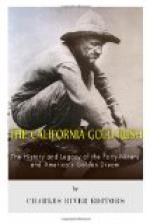On reading the Bulletin editorials, he proceeded at once to King’s office, announcing his intention of shooting the editor on sight. Probably he would have done so except for the accidental circumstance that King happened to be busy at a table with his back turned squarely to the door. Even Casey could not shoot a man in the back, without a word of warning. He was stuttering and excited. The interview was overheard by two men in an adjoining office.
“What do you mean by that article?” cried Casey.
“What article?” asked King.
“That which says I was formerly an inmate of Sing Sing.”
“Is it not true?” asked King quietly.
“That is not the question. I don’t wish my past acts raked up. On that point I am sensitive.”
A slight pause ensued.
“Are you done?” asked King quietly. Then leaping from the chair he burst suddenly into excitement.
“There’s the door, go! And never show your face here again.”
Casey had lost his advantage. At the door he gathered himself together again.
“I’ll say in my paper what I please,” he asserted with a show of bravado.
King was again in control of himself.
“You have a perfect right to do so,” he rejoined. “I shall never notice your paper.”
Casey struck himself on the breast.
“And if necessary I shall defend myself,” he cried.
King bounded again from his seat, livid with anger.
“Go,” he commanded sharply, and Casey went.
Outside in the street Casey found a crowd waiting. The news of his visit to the Bulletin office had spread. His personal friends crowded around asking eager questions. Casey answered with vague generalities: he wasn’t a man to be trifled with, and some people had to find out! Blackmailing was not a healthy occupation when it aimed at a gentleman! He left the general impression that King had apologized. Bragging in this manner, Casey led the way to the Bank Exchange, the fashionable bar not far distant. Here he remained drinking and boasting for some time.




